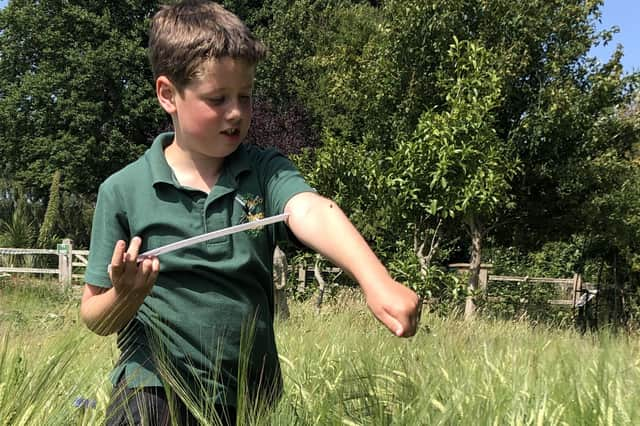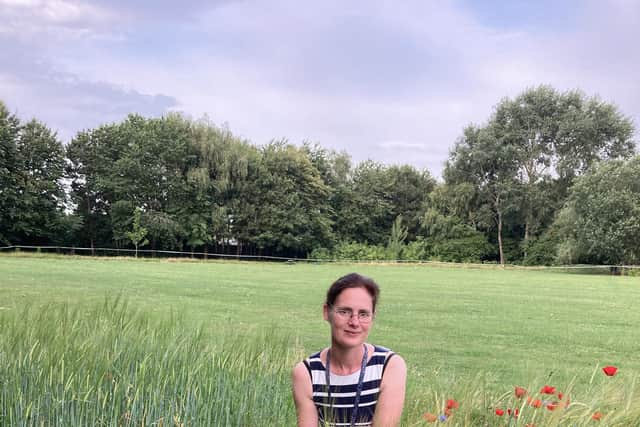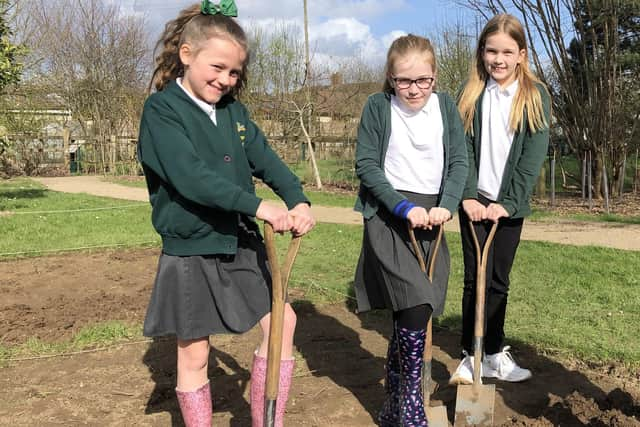Wicor Primary School children cultivate barley and wildflower meadow to create vital wildlife habitat


Pupils have cultivated the fields to create wildlife habitat for dwindling numbers of pollinating insects and to harvest the barley which can be used for food products including cereals, soups and porridge.
The Westminster barley was provided by the University of Reading which is investigating the idea of having cereal crops interspersed with wild meadow flowers such as poppies and cornflowers. Three plots have been cultivated during lockdown with key worker children preparing the soil, sowing the seeds and hopefully harvesting the barley when all pupils return in September.


Advertisement
Hide AdAdvertisement
Hide AdYear 4 teacher Laura Moorhouse said: ‘The children raked the soil and prepared the furrows for the seeds. In the first field they have planted just barley, in the second a mixture of barley and wildflowers and in the third they have created a wildflower border. They have absolutely loved it and have taken real ownership of the fields. They can’t wait to come in each day and see how it has developed.’
Pupil, Amber Parker, nine, said: ‘I liked sowing the barley and watching it grow. It’s a great whole school project to watch and learn what happens when you sow wildflowers and don’t use pesticides.’
The children have been using the project to learn about farming, sustainability, biodiversity and in particular the impact of human activity on insect populations. A recent study showed that 40 per cent of all insect populations are decreasing on average by 2.5 per cent each year.
School horticulturalist, Louise Morton, said: ‘There has been a real problem with the loss of wildflower meadow habitat due to development which along with an increased use of pesticides has had a real impact on the population of our insects such as bees. This has a knock-on effect on the process of natural pollination as well impacting on ecosystem food chains and things such as bird populations.


Advertisement
Hide AdAdvertisement
Hide Ad‘Hopefully this will help farmers see that crops and wildflowers can be cultivated alongside each other.’
Since planting the meadows, the ‘insect population in the fields has doubled’ along with an increase in birds observed.
Laura said: ‘It has been really exciting for the children who have been counting and identifying the insects. We have had lots of moths, bees, ladybirds and even a meadow plant bug.’
Year 4 pupil, Arthur Harris, nine, added: ‘I really enjoyed digging up the turf and recording what insects we have found living in the barley. It is important to create new habitats and exciting because we had never grown barley before.’
Advertisement
Hide AdAdvertisement
Hide AdAccording to figures published by the Buglife Campaign, 90 per cent of crop species are insect pollinated with one out of every three mouthfuls of food consumed produced as a result of pollinators.
A message from the Editor
Thank you for reading this story on portsmouth.co.uk. While I have your attention, I also have an important request to make of you.
With the coronavirus lockdown having a major impact on many of our advertisers - and consequently the revenue we receive - we are more reliant than ever on you taking out a digital subscription.
Subscribe to portsmouth.co.uk and enjoy unlimited access to local news and information online and on our app. With a digital subscription, you can read more than 5 articles, see fewer ads, enjoy faster load times, and get access to exclusive newsletters and content. Visit our Subscription page now to sign up.
Our journalism costs money and we rely on advertising, print and digital revenues to help to support them. By supporting us, we are able to support you in providing trusted, fact-checked content for this website.
Comment Guidelines
National World encourages reader discussion on our stories. User feedback, insights and back-and-forth exchanges add a rich layer of context to reporting. Please review our Community Guidelines before commenting.